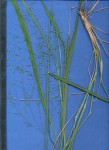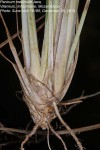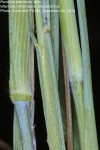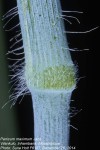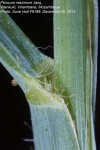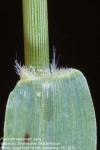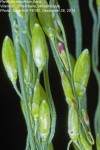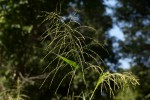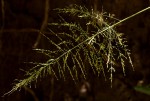Panicum maximum
Selected images: Click on each image to see a larger version and details of the record View all images (14)
Detailed records: Display species records QDS maps by: Google Maps Point records by Google Maps
Species details: Click on each item to see an explanation of that item (Note: opens a new window)
| Synonyms: |
Megathyrsus maximus (Jacq.) B.K. Simon & S.W.L. Jacobs Panicum maximum var. altissimum Kuntze Panicum maximum var. trichoglume Robyns Panicum tephrosanthum Schinz Urochloa maxima (Jacq.) R. Webster |
| Common names: | Buffalo grass (English) Guinea grass (English) |
| Frequency: | Very common |
| Status: | Native |
| Description: |
Tall tufted perennial, usually 1-2 m tall, occasionally much taller. Inflorescence a large open panicle, pyramidal or oblong in outline with the lower branches often whorled. Spikelets 3-4.5 mm, glabrous or pubescent, sometimes overtopped by long hairs from tip of pedicel; lower glume broadly ovate, 1/3 to 1/2 length of spikelet, 3-nerved; upper glume ovate-oblong, 5-nerved, acute; lower lemma ovate-oblong, 5-nerved; upper lemma strongly transversely rugose. |
| Type location: |
Lesser Antilles |
| Notes: | A very common and variable grass, distinguished by its size and the strongly rugose upper lemma. |
| Derivation of specific name: | maximum: largest |
| Habitat: | In a wide variety of natural and disturbed habitats, usually in shade and often preferring damp situations. |
| Altitude range: (metres) | |
| Flowering time: | Sep - Mar |
| Worldwide distribution: | Native in Tropical Africa and Southern Africa; introduced throughout the tropics. |
| FZ divisions: | N,Z,T,MS,GI,M |
| Growth form(s): | |
| Endemic status: | |
| Red data list status: | |
| Insects associated with this species: | Cnaphalocrocis trapezalis (Larval foodplant) Mocis proverai (Larval food plant) Antigastra catalaunalis (Larval food plant) |
| Spot characters: | Display spot characters for this species |
| Images last updated: | Thursday 18 June 2015 |
| Literature: |
Burrows, J.E. & Willis, C.K. (eds) (2005). Plants of the Nyika Plateau Southern African Botanical Diversity Network Report No. 31 SABONET, Pretoria Page 357. (Includes a picture). Chapano, C. & Mamuto, M. (2003). Plants of the Chimanimani District National Herbarium and Botanic Garden, Zimbabwe Page 42. Chapano, C. & Mugarisanwa, N.H. (2003). Plants of the Matobo District National Herbarium and Botanic Garden, Zimbabwe Page 28. Clayton, W.D. (1989). Poaceae Flora Zambesiaca 10(3) Page 17. Heath, A. & Heath, R. (2009). Field Guide to the Plants of Northern Botswana including the Okavango Delta Kew Publishing Page 482. (Includes a picture). Isaiah, A.M. & Komi, T. (2015). Grasses in the Botswana National Botanic Garden South African National Biodiversity Institute, Pretoria Page 29. (Includes a picture). Jackson, G. & Wiehe, P.O. (1958). An Annotated Check List of Nyasaland Grasses The Government Printer, Zomba, Nyasaland Page 51. Mapaura, A. & Timberlake, J. (eds) (2004). A checklist of Zimbabwean vascular plants Southern African Botanical Diversity Network Report No. 33 Sabonet, Pretoria and Harare Page 107. Ntore, S. & al. (2024). Checklist of the vascular plants of Burundi Page 210. Pickering, H. & Roe, E. (2009). Wild Flowers of the Victoria Falls Area Helen Pickering, London Page 96. (Includes a picture). Roodt, V. (2015). Grasses & Grazers of Botswana and the surrounding savanna Struik Nature, South Africa Pages 160 - 161. (Includes a picture). Setshogo, M.P. (2005). Preliminary checklist of the plants of Botswana. Sabonet Report no. 37. Sabonet, Pretoria and Gaborone Page 142. Siebert, S. & Mössmer, M. (Editors) (2002). SABONET Southern Mozambique Expedition 2001; Provisional Plant Checklist of the Maputo Elephant Reserve (MER) and Licuati Forest Reserve (LFR) SABONET News 7(1) Page 28. Strugnell, A.M. (2006). A Checklist of the Spermatophytes of Mount Mulanje, Malawi Scripta Botanica Belgica 34 National Botanic Garden of Belgium Page 151. Timberlake, J.R. & Childes, S.L. (2004). Biodiversity of the Four Corners Area: Technical Reviews Volume Two (Chapter 5-15) Appendix 5-1: Plant Checklist Occasional Publications in Biodiversity 15 Page 191. Troupin, G. & Maquet, P. (1988). Poaceae Flore du Rwanda Spermatophytes Volume IV Page 334. (Includes a picture). |
Other sources of information about Panicum maximum:
Our websites:
Flora of Botswana: Panicum maximumFlora of Burundi: Panicum maximum
Flora of Caprivi: Panicum maximum
Flora of the DRC: Panicum maximum
Flora of Malawi: Panicum maximum
Flora of Rwanda: Panicum maximum
Flora of Zambia: Panicum maximum
Flora of Zimbabwe: Panicum maximum
External websites:
African Plants: A Photo Guide (Senckenberg): Panicum maximumAfrican Plant Database: Panicum maximum
BHL (Biodiversity Heritage Library): Panicum maximum
EOL (Encyclopedia of Life): Panicum maximum
GBIF (Global Biodiversity Information Facility): Panicum maximum
Google: Web - Images - Scholar
iNaturalist: Panicum maximum
IPNI (International Plant Names Index): Panicum maximum
JSTOR Plant Science: Panicum maximum
Mansfeld World Database of Agricultural and Horticultural Crops: Panicum maximum
Plants of the World Online: Panicum maximum
Tropicos: Panicum maximum
Wikipedia: Panicum maximum
